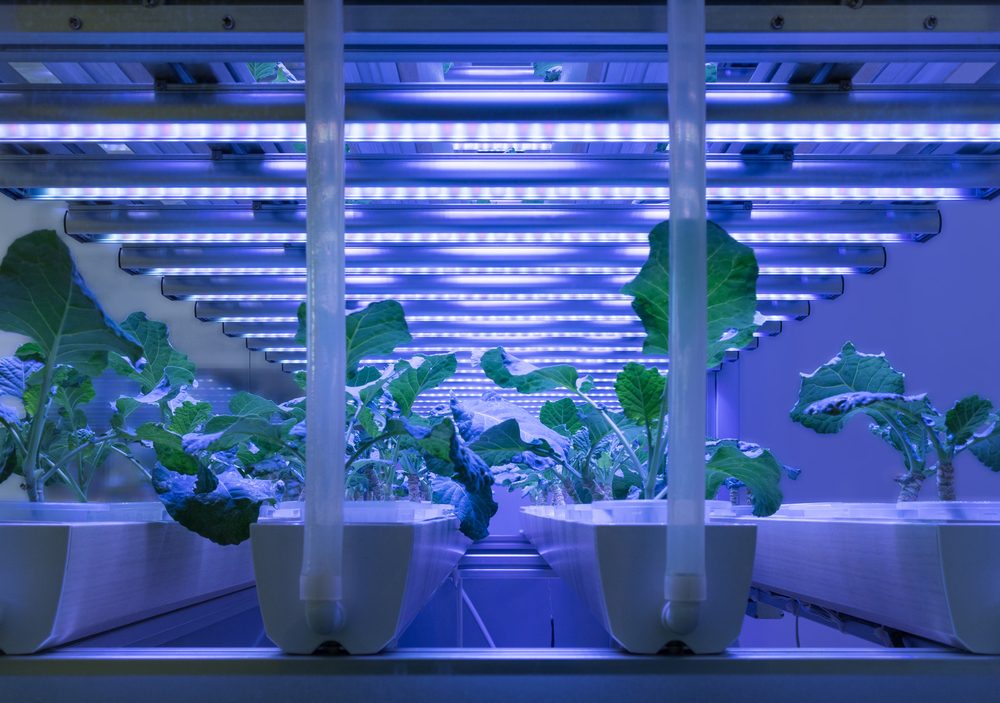What did our visit to an underground farm teach us about agricultural innovations?
At Newton, we are always on the lookout for new innovations. While we are often analyzing specific companies, we also regularly conduct research to better understand industries and processes which might inform our themes through their impact on long-term trends. To this end, a group of Newton team members recently went on a visit to an underground farm in London, to learn more about innovations in agriculture. Agricultural developments inform our ‘Earth matters’, ‘smart revolution’ and ‘population dynamics’ themes, as growing food scarcity and concerns over the health of the planet are sparking all sorts of new technological inventions.
This is the first underground farm in the UK.[1] It occupies a deserted World War II shelter beneath the city, and distributes food locally in London. There are many other empty bomb shelters and disused underground stations that could be repurposed with similar aims, should the project, or sustainable farming in general, expand.
The changing climate raises concerns about feeding a population which is set to continue to expand, especially when farmland is under threat from changes in temperature, weather and rainfall, along with other challenges like soil degradation. In addition, the fact that much of the food eaten within London has travelled many miles before it ever reaches people’s plates is part of what keeps the carbon footprint of agriculture unsustainably high. This small farm aims to pave the way for sustainable, local agriculture, even in the busiest of metropolises.
Underground farms have many positives when it comes to growing food, one of which is that they are insulated from the weather and natural causes of soil erosion, which makes them more resilient. This is useful now, but may prove even more crucial if weather systems become more unpredictable over the coming years, as is indicated by climate-change projections. The farm owners have suggested that underground farms could produce yields of up to sixty times that of a regular farm of a similar size, as they use precision techniques and are not subject to external disruptions. However, as our visit showed, this dream is still in the early stages.
Only a Garnish?
Right now, the farm only grows micro herbs, making clear that there is a way to go before these methods could be used to grow bigger vegetables and grains, let alone enough to feed a significant proportion of London’s population. While we can vouch for the deliciousness of these micro herbs, it is fair to say that they are only a garnish, not a whole meal. However, the owners of this enterprise are confident that underground farming could be scaled up to produce more food. There are definitely efficiency gains to be made: currently, much of the twelve employees’ time and efforts are spent meticulously cleaning the farm, which is necessary to keep it sterile without using industrial chemicals. The sterility is required to ensure the integrity of the resulting produce, while the lack of industrial chemicals is both to avoid polluting the herbs and protect the employees, as it would be unsafe for them to work in a small underground bunker surrounded by toxic fumes. New technology could allow the cleaning process to be sped up and streamlined, freeing up time and resources for the team to spend more time growing food and planning expansions to the project.
Additionally, there are questions about just how sustainable this sustainable farm really is. As you’d expect for an underground farm, there are a lot of lights involved, which require a lot of energy. Carpets are also burned to provide materials for the growing process, and both the farming and the packaging involve some plastic.
The company is aiming to be carbon-neutral by 2020, but, for now, underground farms still negatively affect the environment in their own way, albeit that they are more focused on sustainability than the vast majority of other companies and industries. It is clear that underground farming is very different from traditional farming, which might just be what the agricultural sector needs to continue to thrive in a world going green. However, innovations like these are only likely to be part of the solution, and not the solution to agriculture’s negative environmental impacts and uncertain future in a world of climate change. This is a very complex issue and will require innovations at all levels of the process to develop sustainably over the coming decades.
[1] http://growing-underground.com/
Newton manages a variety of investment strategies. Whether and how ESG considerations are assessed or integrated into Newton’s strategies depends on the asset classes and/or the particular strategy involved, as well as the research and investment approach of each Newton firm. ESG may not be considered for each individual investment and, where ESG is considered, other attributes of an investment may outweigh ESG considerations when making investment decisions.
Any reference to a specific security, country or sector should not be construed as a recommendation to buy or sell this security, country or sector. Please note that strategy holdings and positioning are subject to change without notice.
Important information
This is a financial promotion. Issued by Newton Investment Management Limited, The Bank of New York Mellon Centre, 160 Queen Victoria Street, London, EC4V 4LA. Newton Investment Management Limited is authorized and regulated by the Financial Conduct Authority, 12 Endeavour Square, London, E20 1JN and is a subsidiary of The Bank of New York Mellon Corporation. 'Newton' and/or 'Newton Investment Management' brand refers to Newton Investment Management Limited. Newton is registered in England No. 01371973. VAT registration number GB: 577 7181 95. Newton is registered with the SEC as an investment adviser under the Investment Advisers Act of 1940. Newton's investment business is described in Form ADV, Part 1 and 2, which can be obtained from the SEC.gov website or obtained upon request. Material in this publication is for general information only. The opinions expressed in this document are those of Newton and should not be construed as investment advice or recommendations for any purchase or sale of any specific security or commodity. Certain information contained herein is based on outside sources believed to be reliable, but its accuracy is not guaranteed. You should consult your advisor to determine whether any particular investment strategy is appropriate. This material is for institutional investors only.
Personnel of certain of our BNY Mellon affiliates may act as: (i) registered representatives of BNY Mellon Securities Corporation (in its capacity as a registered broker-dealer) to offer securities, (ii) officers of the Bank of New York Mellon (a New York chartered bank) to offer bank-maintained collective investment funds, and (iii) Associated Persons of BNY Mellon Securities Corporation (in its capacity as a registered investment adviser) to offer separately managed accounts managed by BNY Mellon Investment Management firms, including Newton and (iv) representatives of Newton Americas, a Division of BNY Mellon Securities Corporation, U.S. Distributor of Newton Investment Management Limited.
Unless you are notified to the contrary, the products and services mentioned are not insured by the FDIC (or by any governmental entity) and are not guaranteed by or obligations of The Bank of New York or any of its affiliates. The Bank of New York assumes no responsibility for the accuracy or completeness of the above data and disclaims all expressed or implied warranties in connection therewith. © 2020 The Bank of New York Company, Inc. All rights reserved.





